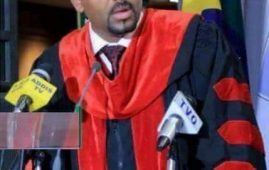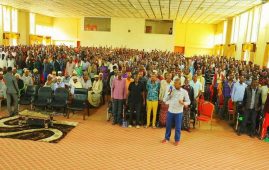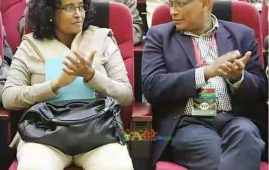It took International Press Institute (IPI) only two days after the polling to make a press statement alleging “Independent Media Voices Absent in Ethiopian Election Coverage.” IPI corroborated its claim by quoting an email of a self-exiled journalist. It was Mesfin Negash, managing editor of the now-defunct Addis-Neger, an Amharic weekly, who took the initiative to expose the ‘absence of the media’ in the polling stations.
The Press Statement by IPI director, issued on May 26/’10, quoted Mesfin Negash’s email as follows:
Referring to a “Code of Conduct for the Mass Media and Journalists” issued by the National Election Board of Ethiopia (NEBE) earlier this year, Negash said: “It prohibits interviewing voters within a 500-meter radius of a polling station. It was even prohibited to take a photo in polling stations … Just outrageous … Practically, however, we have seen that government journalists were transmitting live from within polling stations.”
Had there been any provision with such restrictions, even remotely alike, in the Code of Conduct for the Mass Media and Journalists, this episode would not have been news. Since making statements solely based on allegations of a disgruntled Ethiopian is common with most western organizations.
IPI would have lambasted on the election anyway, with or without such an e-mail. However, this incident raises doubt on how IPI monitors the press freedom in Ethiopia, a country on its ‘watch list’. The Code of Conduct was posted on the official website of NEBE, at least a month before IPI made the statement.
Had Mesfin and his colleagues stopped claiming the higher-ground for the media outlets they run, it would have been hardly surprising that he exploited the opportunity to badmouth the Ethiopian government.
Again, there are individuals and institutions that reiteratively cite to the story of the closing of Addis-Neger as a major strain on the political space.
First Impression
Of course, Addis-Neger newspaper earned a sizable readership among the educated from the start. I attribute the success to its cover-story political analysis. The timing of its launch may have a role, as there were fewer newspapers and the disintegration of the former CUD (KINIJIT) was a hot story, in which the paper, apparently, had an insider.
the educated from the start. I attribute the success to its cover-story political analysis. The timing of its launch may have a role, as there were fewer newspapers and the disintegration of the former CUD (KINIJIT) was a hot story, in which the paper, apparently, had an insider.
Unmistakably, ADDIS-NEGER typified as an opposition media from the start. Yet, it had an incremental effect on the quality of presentation of the printed media. Its effort to recycle worn-out opposition agendas with an intellectual tone was admirable. Its willingness to mention some facts and arguments supportive of the government was commendable, though debilitating them with an astute style of presentation
Nevertheless, that was a short-lived phenomenon. It did not take long before shallow political analyses became the rule in the cover story. Written in haste with long citations taken from blog-posts, the cover story started to appear a manipulative attempt to sell opposition agendas camouflaged with intellectual colors. The ill-informed audience has no way to tell whether the newspaper quoted a blog or a scholarly research. However, apparently, it was the time when its sales gained momentum.
Ironically, it is this group of readers, who started after repeated recommendations from pioneer readers, who came to be the unquestioning admirers of the paper. Sometimes I wonder whether this group of readers is the cause or the result of the decline in the quality of its featured political analysis.
Readers hypothesized on as to why the paper failed to sustain its first impression. Its attempt to include several columnists and non-political sections might have stretched the paper’s resources, thereby undermining the emphasis on the political analysis. One may conjecture that since the audience grew and its brand established, the editors might have felt less pressure to keep their initial standards. Some cite to Abiye T/Mariam’s travel to the west for educational purpose few months later, arguing that it deprived the paper of his and Mesfin Negash’s teamwork, which allegedly had been the major asset of the paper.
Other point at the ‘uneventful’ months that followed the disintegration of CUD (KINIJIT) and the cumbersomeness of writing an informative political analysis in a country where relevant researches are scant. There is also a pressure from sales concerns; presumably, feedback from readers had shown the editors it is the conclusion that matters. That is, if you concede that most Ethiopian newspaper readers fail to appreciate the burden of writing an in-depth analysis and applause if and when they concur with the conclusion.
Be it as it may, the paper had been bereft of its relative scholarly and balanced approach, which made the first impression, long before its first anniversary. Though, it remained worthy reading.
Partisanship Abound
The editors repeatedly wrote alleging they are rumored by the government and the opposition as an affiliate of the other, thereby trying to portray the paper as a non-partisan one. However, no one, except the gullible, took them seriously.
government and the opposition as an affiliate of the other, thereby trying to portray the paper as a non-partisan one. However, no one, except the gullible, took them seriously.
Forget EPRDF, the paper clearly took position even among the opposition parties. Though EDP (Lidetu Ayalew’s party) sent them twice its policy analyses documents, the editors were unwilling to mention it, even as a quotation. The paper supported the Dr. Birhanu-Birtukan faction in the first phase of CUD (KINIJIT) disintegration, forcing Eng. Hailu Shawel’s faction to resort to the pro-EPRDF newspaper Addis-channel to present its version to the public.
Ultimately, no one but the paper itself broke the news. The paper officially abandoned its initial motto of ‘promoting political discourse’. In the end of Sept/09, the paper proclaimed ‘promoting the truth’ as its objective in an Editorial column titled ‘balanced reporting is not our objective’. In short, they are not going to waste time with extensive presentation of different viewpoints, rather ‘enlighten’ the readers with the ‘truth’. I do not wish to engage in semantic gymnastic, as the meaning is crystal clear.
It may be a coincidence that in the week the paper announced ‘balanced reporting is not our objective’, the 4th week of Sept/09, the U.S. mainstream media was under fire. Reason? The media reporting of the debates on Obama’s Health Care proposal did not help the public make-up its mind on the issue. Media critics lambasted the media for “he said that, she said that” style reporting, the exact phrase Addis-Neger’s editor used to explain their position.
Not that ‘new’
The ‘new objective’ was not that new, at least for me. Since, besides to my observation of the paper’s reportage, I had an encounter with the paper six months ago. An encounter that revealed the partisanship of the paper.
The newspaper had been unwilling to print an article, titled ”Woyane-Tigray and the Question of Sovereignty.’’ An article which I co-authored and sent them via e-mail on Feb 28/2008. Except to its pro-EPRDF stance, the quality of the article was befitting of the newspaper, or any other print media for that matter.
The article, citing about half-a-dozen publications, deals with Tigray and the issue of Art 39, hypothetical explanations on the TPLF’s consistency on the Question of Eritrea, discusses the nature of its cooperation with EPLF, among others. Nevertheless, the editors elected not to publish it and could not provide an excuse, though they previously published two articles of mine and communicated me in those cases.
Giving them the benefit of the doubt was my initial reaction, though I expressed my dismay couple of weeks later via SMS. The editors might be avoiding “sensitive issues” or “speculations,” whatever that may mean.
But that was only until they published, a few months later, a blog-post covering similar issues, but advancing an opposite hypothesis. Perhaps, slur is the right word. It was an article by Messay Kebede (Prof/Dr?) titled ‘the underside of the Eritrean Issue’. According to it, TPLF wanted Eritrea’s secession so that Eritrean elites would not rival its ‘domination’ in Ethiopian politics, while Issaiyas Afeworki is the staunch defender of Ethiopian unity.
Curiously, the author did not send it to the newspaper rather posted it on Ethio-media 12 months earlier. The editors of Addis-Neger took the trouble of digging up the archives of Ethio-media, translating it to Amharic to publish.
As I said elsewhere, I choose not to blame the private press for their partisan selectivity. They do not want to be bound by objective criteria and I accept that. As it is a private business, they built in a discouraging environment. However, it confirms what Journalist A. J. Liebling of The New Yorker said in the 1960s, “Freedom of the press belongs to the man who owns one.”
The flee
Being aware where the newspaper really stands in the spectrum of the Ethiopian media, I could not be as naive as IPI or similar organizations to take their words for granted when they alleged ‘to have been tipped by diplomats and insiders about an anticipated government persecution’. Nor did I saw it as a loss of a ‘free press’, in the proper sense of the word.
the Ethiopian media, I could not be as naive as IPI or similar organizations to take their words for granted when they alleged ‘to have been tipped by diplomats and insiders about an anticipated government persecution’. Nor did I saw it as a loss of a ‘free press’, in the proper sense of the word.
It was on the interview the editors gave to the Voice of America(VOA) Amharic program in Dec/’09 that the editors announced that the paper won’t be on the market the following Saturday. Putting aside their general remarks on the regime, Birtukan Mideksa, etc., which you can find in anywhere, they stated a couple of things to backup their allegations of harassment.
Had they been able to concoct a good story for their flee, I could have been tempted to give them the benefit of the doubt, as the paper was one of my favorites ’til its closing and given the natural uneasiness of governments with liberty. However, their story of government harassments is full of holes and hardly convincing.
The ‘weightiest’ of the allegations, frequently reiterated including the aforementioned IPI statement, is their claim to have received credible information about a plan to prosecute Addis-Neger with the new anti-terrorism law. Their source: ‘diplomatic sources’ and ‘government insiders’.
The diplomatic sources thing is simply unconvincing.
For one, everyone knows ‘diplomatic sources’ had been the spice of every political column of the editors on Adds-Neger newspaper. Its dubiousness became evident when Abiye T/Mariam referred to ‘diplomatic sources’ to add weight to his article on the issue of Meles Zenawi’s resignation on April/09, though Abiye was in US/UK at the time.
Secondly, governments do not confide in their partners their plans to prosecute journalists, though they do so when planning war and major affairs.
Moreover, it is hypocritical for Addis Neger editors to claim that their sympathizers inside the government or diplomats can know an anticipated government action. As the newspaper reiteratively alleged that Ethiopia’s foreign policy decisions rest with only 2-3 officials, it would be inconsistent to say a scheme to harass journalists involved a wide circle of officials.
‘The formal but unofficial team’ set at the Ministry of Justice (MOJ) was another allegation raised as a reason, whatever ‘formal but not official’ means.
Let’s get the facts straight first. As there is no pre-release censorship, the government monitors the press after their publications. Thus, all press outlets submit a copy of their publications to the concerned government organ. The last time I checked it was MOJ. Thus, MOJ reviews all newspapers by assigning junior legal experts. In other words, looking for prosecutable violations of the law is one of the daily tasks, same as every prosecution office around the world.
Every week, the tasked experts submit, to their bosses, long memos listing each and every possibly chargeable flaw they find in the press. Apparently, the higher-officials, who are mandated to decide whether to prosecute or not, decide to let 99% of the cases pass, as it is not useful nor economical to prosecute every single offence. At the time when Addis-Neger was in the market, the government charged the press in a very few instances. In fact, the government had never taken Addis-Neger editors to court.
One of the editors improvised this allegation, by claiming the ‘formal but unofficial team in the MOJ’ is an inter-agency one – with members from the National Intelligence and Security Agency (NISS).
Hard to imagine what input NISS can provide in the making of a legal charge. The involvement of NISS would be sensible only if the government really suspected a link between Addis-Neger and CIA, as the editors repeatedly say. As it is prudent to conduct a thorough investigation when a breach of national security is suspected. But still in that case, I cannot see why NISS would need a hand from MOJ.
Let’s assume, for the sake argument, MOJ tasked two or three of its legal experts to review the case of Addis-Neger. That would only show the prudence of MOJ officials. Since there were several complaints against the newspaper from several directions, including the Ethiopian Orthodox Church, the Coalition for Unity and Democracy party, a private-owned hotel.
There was more. Being followed by security agents was another reason that allegedly frightened the editors. You do not need to know the capacity of NISS to conduct espionage undetected, with the know- how and equipments accumulated in three regimes. Anyone with brief acquaintance with espionage books or movies can tell, either the allegation is a result of paranoia or if not out-right fictitious. One can speculate if the government could have done that to scare them, but there is nothing to back it up.
how and equipments accumulated in three regimes. Anyone with brief acquaintance with espionage books or movies can tell, either the allegation is a result of paranoia or if not out-right fictitious. One can speculate if the government could have done that to scare them, but there is nothing to back it up.
Of course, there were a few articles critical of Addis-Neger published on Addis-Zemen. According to the statement by the editors, it is not the content that bothered them rather the newspaper on which they are published. Well then, I ask, where else? It is a known fact that the private press shy away from criticizing one another. It is a longstanding, though unwritten, cartel.
ETV was preparing, according to Addis-Neger editors, ‘an accusatory documentary’ that they suspected to be a prelude of an upcoming harassment. However, as it turned out, it was simply a second part of a previously aired documentary ‘freedom of the press yesterday and today’ with no reference to Addis-Neger.
True to form, the newspaper made similar allegations a week before ETV aired the first part of that documentary. There was a column by the editors, titled “we have got the message”, citing articles on Addis-Zemen as an evidence of an upcoming harassment. However, the following week, ETV aired the first part, which was highly favourable to Addis-Neger.
The phone call. I think the allegation that they received a warning by a phone call from Getachew, the Director of NISS, a year before the closing of Addis-Neger, is not a significant one. As it, allegedly, happened long ago. However, a phone call to the editors by Getachew seems unlikely, given his management style – reportedly, he avoid publicity by staying away from all non-essential encounters, be it in or outside his agency.
Moreover, it is to be recalled that a newspaper reported the editors left the country formally boarding an international flight from the capital city. According to the report, which the editors did not deny, the editors left in a period of two months – Abiye on Sept 29/09; Mesfin on Oct. 04/10/09; and Tamrat on Nov. 12/09.
Contradiction with Dawit Kebede. In the week after the closing of Addis-Neger, Dawit Kebede, the owner of the Amharic weekly, Awramba-Times wrote a column compassionate for Addis-Neger editors. However, he claimed Mesfin Negash shared him the tip from diplomatic sources about ‘an upcoming crackdown against the print media’ when they met in Hilton Hotel weeks before.
However, according to Mesfin Negash’s statement on VOA, his sources indicated the government is focused on Addis-Neger. It is hard to tell whether Mesfin widened the scope of the info to get Dawit on board of his project of flee. It could also be Dawit’s maneuver to include himself paper in the victim list as a proof of his opposition stance on the government.
Concluding thoughts
Writing this lengthy article, I find myself constantly troubled by the possibility that they could be telling the truth. I cannot simply shrug it off. What if the government scared them in ways they cannot publicly state. In very subtle ways, perhaps with private affairs. What if the government was planning something wicked and they found out by sheer chance or divine intervention.
But, well then, what if they are part of a plot to tarnish the election year, as the government suggested following the broadcast of their allegations on VOA.
Lest we confine with objectivity, a venture into mere speculation would only lead us to an affirmation of our predisposition rather than the truth. The truth-value of a statement should be judged, at least in public discourse, by its correspondence or coherence with the reality.
Thus, Mesfin Negash’s e-mail to IPI, which was not supposed to be public, only confirms the objective observations of the Addis-Neger saga.
The incident revealed deception has become the rule, rather than the exception.
I rest my case.



